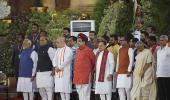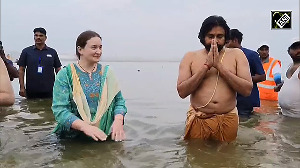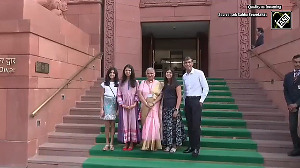'They were very vocal on the defence of the Constitution, reservation, SC/ST Act and democratic rights.'

"The question of the Constitution, democracy and reservation overrode the benefits accruing from beneficiary schemes," Dr Prashant Trivedi, the Lucknow-based social scientist and professor at the Giri Institute of Developmental Studies, tells Rediff.com's Archana Masih
.
Dr Trivedi's research interests include the political economy of land reforms, rural studies and issues relating to Dalits, Muslims and Women, with a particular focus on Uttar Pradesh.
In Uttar Pradesh the BJP's seat tally reduced by half and a big chunk of Dalit and backward votes went to the Samajwadi Party-Congress alliance. What is the reason for this shift?
This was a 'Back to Basics' election. People's issues like jobs, inflation, agriculture acquired centre-stage and made this a watershed moment in the politics of the state.
I call it 'back to basics' because apart from people's issues, caste equations played a major role in determining the outcome.
Dalit women played an important role in setting the agenda of this election. They were very vocal on the defence of the Constitution, reservation, SC/ST Act and democratic rights.
The tone and agenda of this election was set by Dalit women.
42 of the 72 ministers in the Modi ministry are OBC/SC/STs including 6 from UP. Will this help in the BJP gaining their confidence again?
There were more ministers from UP in the last government who represented larger number of castes including OBC and scheduled castes, but that did not work to the advantage of the incumbent government.
The result was a reflection of the clear message given by the OBC and SC communities. They want substantive share in power rather than mere numerical representation.
Across villages, we heard during field surveys that even when people's representatives belonged to their own castes, they were ineffective in delivering and dealing with grievances.
We will have to see how this government takes policy decisions to decentralise power and delegate more powers to OBC and SC/ST representatives so that people feel included in governance rather than be recipients of government largess.

It was largely believed that a large number of Dalit and backward voters would vote for Mr Modi because of central government welfare scheme like free ration, Ayushman Bharat etc?
People are well aware of the welfare schemes and acknowledge that the delivery mechanism is more efficient and leakages have been checked due to a digital delivery platform.
However, the question of the Constitution, democracy and reservation overrode the benefits accruing from beneficiary schemes.
Only a small section of women voters were inclined towards the BJP based on their access to beneficiary schemes. The general sentiment, particularly among the Dalit community was that their first and foremost task was the defence of political rights vested upon them by the Constitution of India.

So 'Constitution khatre mein hai' trumped everything else like '400 sau paar' or the construction of the Ram Mandir?
Yes, particularly among Dalits and BSP supporters. It was the first and foremost issue for them because they felt the Constitution written by Babasaheb Bhimrao Ambedkar was in danger.
Their concern was that if the BJP won 400 seats, they would change the Constitution and Dalits would once again go back to the discrimination they faced before the framing of the Constitution which gave them equal rights.
Many were talking about what Dalits suffered in the pre-Independence era like forced labour and the absence of social rights. They thought there was a risk of a return to those days and that is why Dalits, particularly women, came out in defence of Babasaheb's Constitution.
A bulk of Dalit/OBC votes have moved to the SP-Congress. How difficult will it be to hold onto these votes that they have taken away from the BJP?
It has to be seen in the next 4-5 years.

Especially because the BSP is on the decline.
The BSP is on the decline, but its voters are still attached to the party. They want to vote for it, but since the BSP was not in the fight, they thought it was better to tactically vote against the BJP.
They voted for the INDIA formation, but it does not mean that they have abandoned the BSP. Tomorrow, if the BSP comes back to life, for example, by the return of Akash Anand [political heir who was sacked by Mayawati in May], they will return to their party.
During our field work we came across Dalit women who told us that they had never thought that they would not vote for the BSP in their lifetimes, but they were compelled to vote for another party because their future was at stake.
Chandra Shekhar Azad is drawing great response from the media and mobile savvy youth. He has the potential to become a larger figure in Dalit politics.
- Part 2 of the Interview: 'Hindutva Can't Be Written Off'
Feature Presentation: Aslam Hunani/Rediff.com











 © 2025
© 2025